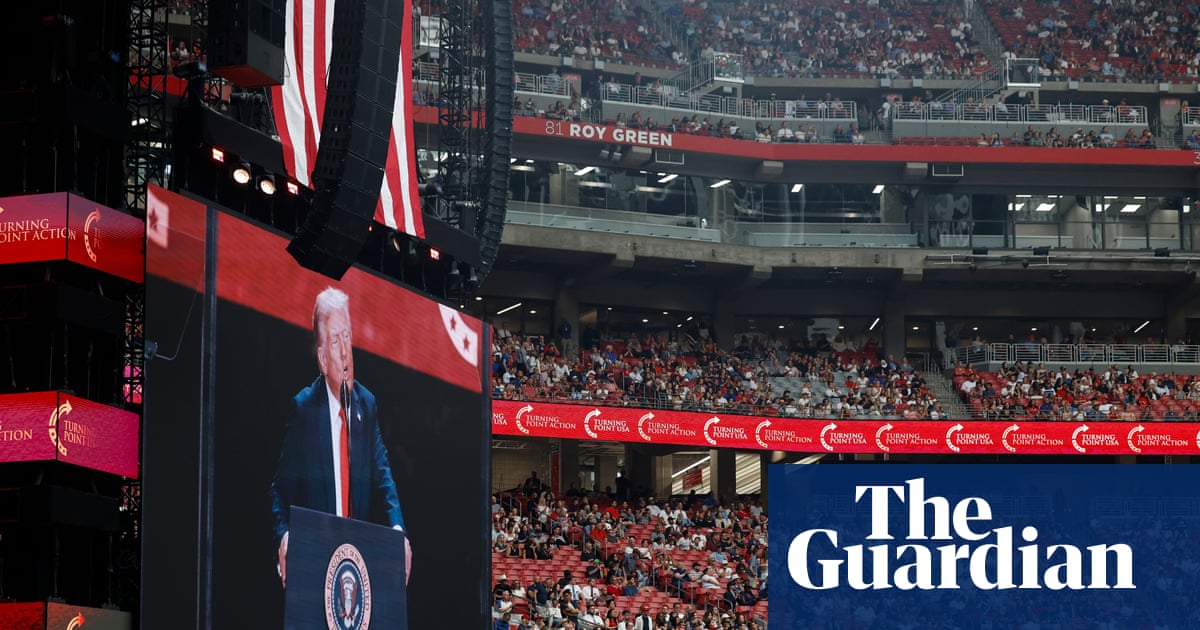Glorifying a Martyr: The Complex Legacy of Charlie Kirk
On a poignant Sunday in Glendale, Arizona, the late conservative activist Charlie Kirk was memorialized in a grand display that intertwined nationalistic fervor with religious devotion, drawing nearly 100,000 attendees to an American football stadium. The service, organized by Kirk’s own organization, Turning Point USA, showcased not only the deep-seated admiration for the 31-year-old but also underscored the current political landscape within the Republican Party, particularly under the leadership of Donald Trump.
A Service of Faith and Politics
The memorial was described as part religious revival and part political rally, embodying the Christian nationalism that has increasingly defined Trump’s “Make America Great Again” movement. As mourners saw Kirk not only as a political figure but as a martyr, some attendees wore red, white, and blue and participated in what felt like a megachurch service, swaying to the music of leading Christian rock artists. In an emotional address, Kirk’s widow, Erika, reconciled the tragedy of her husband’s death by expressing forgiveness towards his accused killer, stating, “My husband, Charlie, he wanted to save young men, just like the one who took his life. I forgive him.”
The Political Fallout
The atmosphere shifted dramatically when political figures took the stage. Trump and his supporters reframed Kirk’s death as a rallying point in the conservative movement. Stephen Miller, a former White House deputy chief of staff, characterized the event as a call to arms, asserting that Kirk’s killing awakened a "dragon" whose wrath would be felt in defense of their values. This blend of mourning and aggression left many uneasy, as Trump declared, "The violence comes largely from the left." Such statements ignited concerns that Kirk’s murder might be used to fuel political vendettas, intensifying already simmering tensions in the political discourse.
Democrats’ Delicate Dance
In the wake of the memorial, Democrats found themselves in a precarious position. The potential for backlash loomed large if they were perceived as criticizing an event steeped in grief and fervor. Even prominent voices like Joe Scarborough of MSNBC highlighted a discordant note during the event. He commented on the stark deviation from the religious focus that dominated the earlier part of the service as political speeches unfolded, leaving many feeling uneasy about the tone.
Presidential historian Jon Meacham articulated the dilemma further, encouraging progressives not to feel inherently uncomfortable with the religious sentiments expressed during the service. He emphasized the importance of genuinely recognizing the faith component, particularly as demonstrated by Erika Kirk’s words. The juxtaposition of principled forgiveness with political warfare presents a challenge for Democrats trying to connect with America’s religious heartland.
A Controversial Figure’s Legacy
Charlie Kirk was not without controversy. His past statements have drawn ire for being racist, misogynistic, and transphobic, leading some to question the veneration he receives. The circumstances surrounding his tragic death—shot during a campus event by a young man who reportedly had enough of Kirk’s “hate”—highlight the deeply polarized environment he helped foster. As investigators delved into the motives behind his murder, it raised critical questions about the implications of inflammatory rhetoric in contemporary political discourse.
A Path Forward for Turning Point USA
In the midst of this turmoil, Turning Point USA is experiencing a surge of support, buoyed by big donations and commitments from young conservatives eager to carry on Kirk’s work. Erika Kirk’s ascendance to leadership marks a pivotal moment for the organization, which has played a significant role in energizing young voters in previous elections. The sense of urgency to mobilize in honor of Charlie Kirk’s legacy could redefine the organization’s trajectory as it adapts to a shifting political landscape.
A Complex Emotional Landscape
As the dust settles from the memorial, the emotional landscape remains complex. For many, the service was a heartfelt goodbye to a fallen ally, a champion of conservative values, and a martyr in their ongoing struggle against perceived leftist encroachment. For others, it served as a stark reminder of the divisive political climate and the potential dangers of political extremism woven with deeply held beliefs.
The melancholy resonance of a memorial steeped in political allegiance and religious fervor continues to echo through both sides of the aisle, underscoring the increasing entrenchment of faith in the fabric of contemporary American politics.



